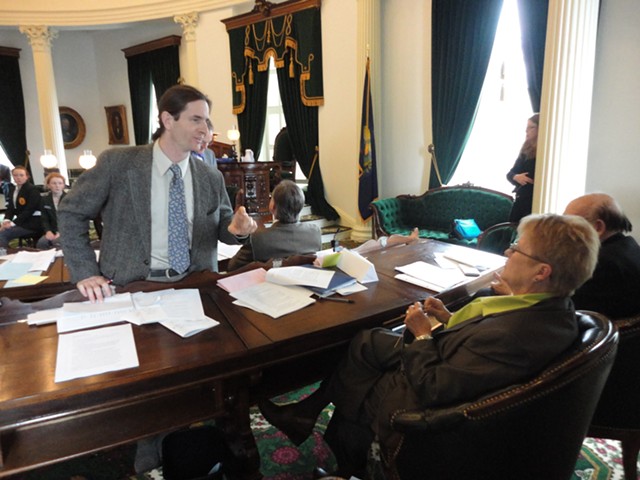Switch to the mobile version of this page.
Vermont's Independent Voice
- News
- Arts+Culture
- Home+Design
- Food
- Cannabis
- Music
- On Screen
- Events
- Jobs
- Obituaries
- Classifieds
- Personals
Browse News
Departments
Browse Arts + Culture
View All
local resources
Browse Food + Drink
View All
Browse Cannabis
View All
-
Culture

'Cannasations' Podcaster Kris Brown Aims to 'Humanize'…
-
True 802

A Burlington Cannabis Shop Plans to Host…
-
Business

Judge Tosses Burlington Cannabiz Owner's Lawsuit
-
Health + Fitness

Vermont's Cannabis Nurse Hotline Answers Health Questions…
-
Business

Waterbury Couple Buy Rare Vermont Cannabis License
Browse Music
View All
Browse On Screen
Browse Events
View All
Quick Links
Browse Classifieds
Browse Personals
-

If you're looking for "I Spys," dating or LTRs, this is your scene.
View Profiles
Special Reports
Pubs+More
Friday, April 19, 2013
News / Statehouse In Brazen About-Face, Senate Nixes Corporate Donation Ban It Approved Weeks Before
Posted By Paul Heintz on Fri, Apr 19, 2013 at 12:33 PM
When the Vermont Senate voted 21-8 three weeks ago to ban corporate and union contributions to political candidates, chuckling broke out on the Senate floor.
Aware that many of those voting in the affirmative had long opposed such a move, Sen. David Zuckerman(P/D-Chittenden) stood up to say, "I hope the 'yes' votes were sincere."
Turns out they weren't.
On Thursday, with a much broader campaign-finance bill on the verge of final passage, the Senate dramatically reversed course, stripping that legislation of the corporate and union donation ban. This time they voted 19-11 against prohibiting such contributions.
Furious with the last-minute about-face, the ban's chief proponent, Sen. Peter Galbraith (D-Windham), cast the lone vote against the broader campaign-finance bill, as 29 of his colleagues voted to send it to the House for consideration.
"This bill is a sham," Galbraith said after the final vote was cast. "It is intended to persuade Vermonters that we are serious about campaign-finance reform when we are not."
Pictured above: Zuckerman attempts to pigeonhole Sen. Ann Cummings (D-Washington) during a brief recess.
Thursday's floor action brought to a close three weeks of behind-the-scenes machinations by those seeking to kill or stall the bill — or to strip it of its most radioactive element. First they tried to send the amended bill back to committee to excise the corporate and union donation ban. Then they tried to do it at a meeting of the Democratic caucus.
But the ban remained intact last Friday when the Senate granted preliminary passage to the underlying campaign-finance bill by a vote of 24-3.
The plot thickened this Wednesday, when Sen. Alice Nitka (D-Windsor) claimed during debate on final passage that she had been confused about the corporate and union donation ban. Evidently she hadn't realized it would ban such entities — including small businesses — from contributing to political candidates.
In rapid succession, Sens. Jeanette White (D-Windsor), Ann Cummings (D-Washington) and John Rodgers (D-Essex/Orleans) stood up to say they, too, had been confused by the language. Never mind the fact that White, who chairs the committee that wrote the underlying bill, has taken testimony on and opposed the ban consistently for three years.
By Thursday, that group had drafted an amendment striking out the ban and replacing it with a study — once again allowing corporations and unions to donate up to $3000 directly to political candidates.
Cummings, who had originally voted for the ban, told her colleagues she now opposed it because she feared potential candidates would be discouraged from running if they couldn't collect checks from local businesses and other incorporated entities. Furthermore, she said, she's seen no evidence of business interests controlling the dialogue in Vermont politics.
"We hear a lot about deep-pocketed corporations. Well, in my experience, there's a lot more small individuals making donations than deep-pocketed corporations," she said. "I haven't heard that anyone around here has been bought."
Last year, Cummings raised just $1100 from five individual donors and $3900 from 14 corporations, unions and political action committees. Among her contributors were AT&T ($400), Comcast ($300) and Caremark ($200).
Calling fundraising "a hard job," Cummings said, "I still haven't heard of a problem that justifies making it more difficult to raise the funds you need to run for office."
"We're Montpelier. We're not D.C.," she said. "And I think we need to take the time to size this so that we only get — if there are some big guys with deep pockets making lots of contributions, that we stop that. But that we don't, at the same time, penalize the average Vermonter who's trying to run a campaign for the House or the Senate."
Sen. Phil Baruth (D-Chittenden), a cosponsor of Galbraith's original amendment, had a different take.
"I've heard a number of people say that we don't have a problem in Vermont. 'We're not D.C. There's not a problem with corporate money,'" Baruth began. "But I would suggest to everyone in this chamber, we have a problem. And the problem is moving campaign finance through this chamber."
He then recounted the tortured path the campaign-finance bill has taken over the past several years as the Senate has assiduously avoided limiting who can donate to their campaigns. At one point two years ago, Baruth noted, the bill literally went missing for a year when White evidently misplaced it.
"Now we've all conveniently forgotten that, but that was the case. And when it was found, it was found too late to change the election. Now that's not accidental," Baruth said. "And I would say that we are experiencing exactly the same thing this time around. We've taken two votes—"
"Point of order, Mr. President," Sen. Peg Flory (R-Rutland) interjected. "I don't believe a senator is allowed to question the motives of another senator."
"I don't believe that I did question the motives," Baruth responded.
Lt. Gov. Phil Scott, the presiding officer, sided with Flory and instructed Baruth to "restrain" himself and stick to the substance of the amendment.
But Baruth didn't.
Noting that the bill itself purported to guard against the appearance of corruption, Baruth said that over the past several years there has been an appearance that his fellow senators have been blocking the campaign-finance bill from consideration. To his great relief, he said, that changed this year when the body took up the legislation and even voted for the corporate-contribution ban.
But, like Zuckerman, Baruth intimated that he also doubted his colleagues' sincerity.
"At the time — and again I will confine my remarks to appearances — there was the appearance that some senators had not been sincere in their vote because there was a great deal of snickering in the chamber. So—" Baruth said, before Senate President Pro Tem John Campbell (D-Windsor) interrupted him to request a recess.
Tempers flaring, a horde of senators then converged on the floor and directed their ire toward Baruth.
"You better stop and think of what you're saying," Sen. Dick Mazza (D-Grand Isle) said to Baruth.
"I'm going to finish this speech and I literally don't care what you say," Baruth responded. "I'm going to finish."
"That's nice," Mazza said. "That's a nice attitude."
With reporters looking on, Campbell sought to break up the scrum and sent the senators back to their desks, at which point Baruth resumed his monologue.
Calling the vote three weeks before to ban corporations "the proudest moment I had this year" and "close to the proudest moment I've ever had in the Senate," he urged his colleagues to stay the course.
"For everyone who cares about this issue — who cares about the issue of natural-born persons versus corporate money — this body voted twice, overwhelmingly, to limit corporate money," Baruth said. "We are about to take another vote — a third vote — on the same issue. It is my great hope that we go down the path that we took those last two times and don't give people the appearance that something is wrong by doing a U-turn and overturning those major votes that we made earlier this session."
In the end, the Senate took that U-turn.
When the roll was called, 12 senators who had previously voted in favor of the ban flip-flopped and voted against it. They were Sens. Campbell, Don Collins (D-Franklin), Cummings, Bill Doyle (R-Washington), Bob Hartwell (D-Bennington), Jane Kitchell (D-Caledonia), Mazza, Norm McAllister (R-Franklin), Kevin Mullin (R-Rutland), Rodgers, Bobby Starr (D-Essex/Orleans) and Rich Westman (R-Lamoille).
Joing them in voting to strip out the ban were seven senators who had opposed the ban in the first place. They were Sens. Claire Ayer (D-Addison), Chris Bray (D-Addison), Flory, Eldred French (D-Rutland),Nitka, Diane Snelling (R-Chittenden) and White.
Sen. Ginny Lyons (D-Chittenden), who had previously voted against the ban, voted to keep it in the bill.
Voting consistently to ban corporate and union donations were Tim Ashe (D/P-Chittenden), Baruth, Joe Benning (R-Caledonia), Sally Fox (D-Chittenden), Galbraith, Mark MacDonald (D-Orange), Dick McCormack (D-Windsor), Anthony Pollina (P/D-Washington), Dick Sears (D-Bennington) and Zuckerman.
After several more amendments were considered, the Senate approved the underlying campaign-finance bill with a near-unanimous vote. Only Galbraith opposed it.
The larger bill includes new contribution limits, candidate-reporting requirements and contributor- disclosure requirements. That bill now moves to the House, where Speaker Shap Smith (D-Morrisville) has been cool to the idea of limiting corporate and union contributions.
In his closing remarks during Friday's debate, Galbraith once again noted that the Senate's opposition to banning corporate contributions stands in stark contrast to its 26-3 vote last April calling for a constitutional amendment reversing the U.S. Supreme Court's Citizens United decision.
"This Senate has proposed a constitutional amendment to undo Citizens United with the goal of getting corporate money out of politics," Galbraith said. "But our real message is: Let's get corporate money out of politics, but please don't take away my corporate contribution. There is one word for this: hypocrisy."
Comments (17)
Showing 1-17 of 17
Comments are closed.
Since 2014, Seven Days has allowed readers to comment on all stories posted on our website. While we’ve appreciated the suggestions and insights, the time has come to shut them down — at least temporarily.
While we champion free speech, facts are a matter of life and death during the coronavirus pandemic, and right now Seven Days is prioritizing the production of responsible journalism over moderating online debates between readers.
To criticize, correct or praise our reporting, please send us a letter to the editor. Or send us a tip. We’ll check it out and report the results.
Online comments may return when we have better tech tools for managing them. Thanks for reading.
One or more images has been removed from this article. For further information, contact
[email protected].
Related Stories
About The Author

Paul Heintz
Bio:
Paul Heintz was part of the Seven Days news team from 2012 to 2020. He served as political editor and wrote the "Fair Game" political column before becoming a staff writer.
Paul Heintz was part of the Seven Days news team from 2012 to 2020. He served as political editor and wrote the "Fair Game" political column before becoming a staff writer.













































